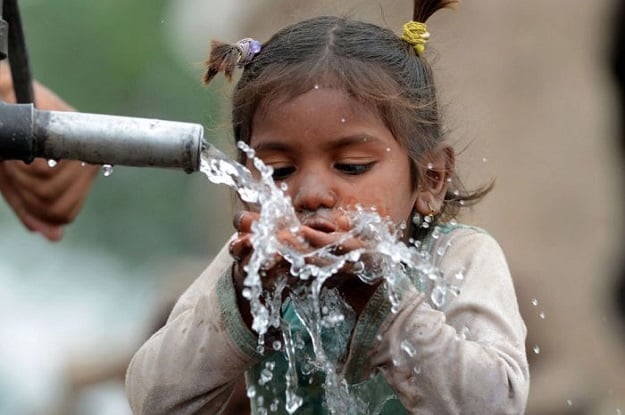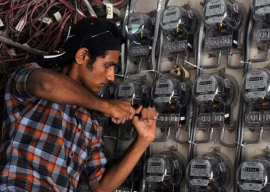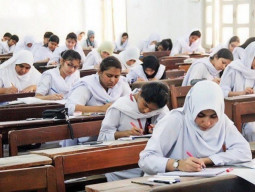
Karachi has a shortfall of around 600 million gallons of water per day (MGD). If this number is to be believed, then how can people buy as much water as they need as long as they are willing to pay for it?
The problem does not lie in the shortfall of water. Rather, it is centred on the epidemic of making money out of utilities that were meant to reach people for free, remarked Chief Justice of Pakistan Justice Anwar Zaheer Jamali on Wednesday.
He was heading a three-judge bench, comprising justices Amir Hani Muslim and Maqbool Baqar, when he observed that the water crisis in the country’s financial hub was due to the authority’s negligence and mismanagement. The apex court had taken up the case of unauthorised use of illegal water hydrants at the Supreme Court Karachi Registry.
“No one is dying of thirst,” he pointed out, adding that it only means that people are being compelled to buy water for drinking. At the outset of the hearing, Karachi Water and Sewerage Board (KWSB) managing director Misbahuddin Farid gave a briefing on the utility’s hydrant programme. He reiterated the water board’s idea that hydrants are necessary as water cannot be channelled to every part of the city. Hydrants are needed for emergencies as well, he said, explaining how tankers were sent for the internally displaced persons (IDPs) in Nawabshah, Badin and other remote areas in the past few years.
“The department still owes around Rs320 million to private contractors who carried water there,” said Farid, adding that the service was provided on the directions of the provincial government. Justice Muslim inquired whether or not the tankers reached the IDPs but Farid failed to confirm.
Nearly 80 per cent of the bills deposited with the utility are bogus, remarked Justice Baqar but Farid chose to stay quiet. The judge asked him once again to check the invoices before he makes the payments. Justice Jamali pointed out that the same funds could have been spent on installing pipelines from nearby water sources.
On the water shortfall, the water board chief blamed the federal government for delaying the funds for the Rs29-billion K-IV project for the past eight years. The project, conceived in 2006, will be able to pump an additional 260 million gallons into the city every day. “The K-IV project, once completed, will improve water supply,” said Farid.
Justice Jamali remarked that planning such a project involves incorporating future needs. Unfortunately, the authorities have yet to cope with present needs, he added.
Farid also told the bench that 70 per cent of water tankers provide water to DHA only. Cutting off their supply will cause massive inconvenience, therefore, hydrants cannot be shut down with immediate effect, he said.
DHA’s desalination plant
The Defence Housing Authority (DHA) was also questioned on the measures taken to resolve water issues in the neighbourhood. In year 2004, DHA had started installing a desalination plant, to convert sea water into fresh water, and completed it in four years. The plant operated for a few months before it was shut down completely.
DHA secretary Brigadier (retd) Naeem Azhar Lone told the bench that DHA has only 8.8 per cent stakes in the plant, which is run by a private company. The judges were not happy with his response. Whosoever is the proponent of the project, possesses the ownership, Justice Baqar remarked.
Justice Muslim asked Lone if DHA has made any effort to restart the plant but the DHA official blamed the KWSB this time. The water board is not providing the promised supply of 9MGD, he said.
On the rapid construction taking place in DHA Phase VIII, Justice Jamali wondered if the housing authority has made arrangements to provide water. The secretary said that a reverse-osmosis plant is being set up, which will be able to pump 8MGD to the vicinity. Once again, the bench reprimanded DHA for expanding the project without completing infrastructure on basic utilities. They told Lone to not force the court to ban all new projects in the area unless water is supplied.
To-do list: SC to review cases in lower courts
The three-member SC bench asked the water board’s top official on Wednesday to provide the court, within a day, a list of all supply-related cases against the water board pending in the subordinate judiciary. The list should include those cases in which private contractors have taken a stay against cutting off of the supply line.
Those cases will be scrutinised and the relevant courts will be intimidated to hear and decide them as top priority. The bench adjourned the hearing for a later date.
Published in The Express Tribune, October 22nd, 2015.

1725443747-0/Untitled-design-(5)1725443747-0-165x106.webp)


1724238420-0/Untitled-design-(3)1724238420-0-165x106.webp)












COMMENTS
Comments are moderated and generally will be posted if they are on-topic and not abusive.
For more information, please see our Comments FAQ